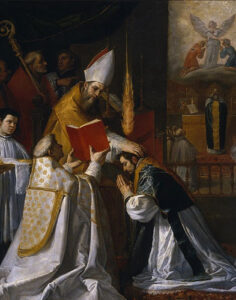Monday, 5th Week of Easter
Regarding the second, Christ tells twice us that “my Father will love” the one who loves Him. In both cases, it’s interesting that Christ puts the verb in the future, “the Father will love.” We know that God has loved us from all eternity, and that He loved us so much that He sent His only begotten Son into the world to die for us, even before we were born, even knowing how sinful we would be. Certainly God loved us before.
As Saint Thomas Aquinas explains, this future love means that “God will show the effect of His love,”[3] in other words, the person who knows His commandments and keeps them will be so loved by God as to warrant seeing Him face-to-face in heaven, the ultimate and greatest effect of God’s love. When a soul gives itself entirely to God, when it truly seeks Him with all its heart, God rewards it with the gift of Himself, the fulfillment of all desires. The condition for that, however, is that we really give ourselves to Him entirely: in The Way of Perfection, Saint Teresa of Jesus writes, “God refuses to force our will. He takes what we give Him, but does not give Himself wholly until He sees that we are giving ourselves entirely to Him.”
We can ask ourselves: how well do we try to keep God’s commandments, especially out of pure love for Him? Do we really believe that He rewards those who seek Him? Do we really want that reward? Through the intercession of Mary, Mother of Divine Love, let us ask for the grace to love Christ and act in accord with that love.
Notes—
[2] Cited in Larry Richards Surrender!: The Life-Changing Power of Doing God’s Will.
[3] Aquinas, Commentary on the Gospel According to Saint John, 1935.







